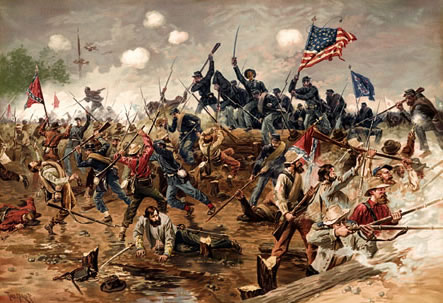The New York Times’ Disunion series has an excellent essay on Nathaniel Hawthorne by Cynthia Wachtell, author of “War No More: The Antiwar Impulse in American Literature, 1861-1914.” In 1863, Hawthorne wrote to an English friend: “The war-party here do not look upon me as a reliably loyal man, and, in fact, I have been publicly accused of treasonable sympathies.”
The article notes: “In Concord, where Hawthorne moved in 1860 after spending seven years abroad, he found himself out of step with his old friends Ralph Waldo Emerson and Henry David Thoreau (who died in May 1862), as well as others of his neighbors.” There was perhaps more enthusiasm for going to war in Massachusetts than in any other northern state. While Ralph Waldo Emerson initially supported the war, he made sure that his son was not conscripted into the Union meat-grinder. Hawthorne, in an essay he wrote after spending time in Washington, DC, and Virginia, scoffed at the glorification of the conflict. Wachtell notes: “Hawthorne tramples on the era’s well-respected literary conventions and proprieties: he does not adopt a strident tone of Union partisanship. He does not offer mournful lines about the deaths of brave and beautiful soldiers. He does not deliver the sort of rousing or circumspect reporting that routinely filled Northern newspapers and magazines.”
“Hawthorne refused to adhere to the restrained and respectful norms of wartime writing, and he expressed none of the standard wartime pieties. Instead, he used black humor to devastating effect. Describing battlefield deaths, he wrote, ‘A bullet offers such a brief and easy way, such a pretty little orifice, through which the weary spirit might seize the opportunity to be exhaled!’
“Where others saw a noble war to end slavery and preserve the Union, Hawthorne saw a questionable conflict that claimed the lives of young men, empowered inept generals, and seemed unlikely to end with a subdued South…”
Hawthorne suffered “the opprobrium of his neighbors. Acquaintances shunned him, while old friends could only shake their heads…. No topic is beyond the reach of his wit: not generals, not the war dead, not even the Northern martyr and darling of the transcendentalists of Concord, John Brown.”
I have been a huge fan of Thoreau and Emerson since I was 18. But seeing how they embraced war as a means of moral/national uplift — sad to see those philosophers go wrong. Emerson was skeptical of government – except when folks proposed that it launch a bloody crusade.


Comments are closed.